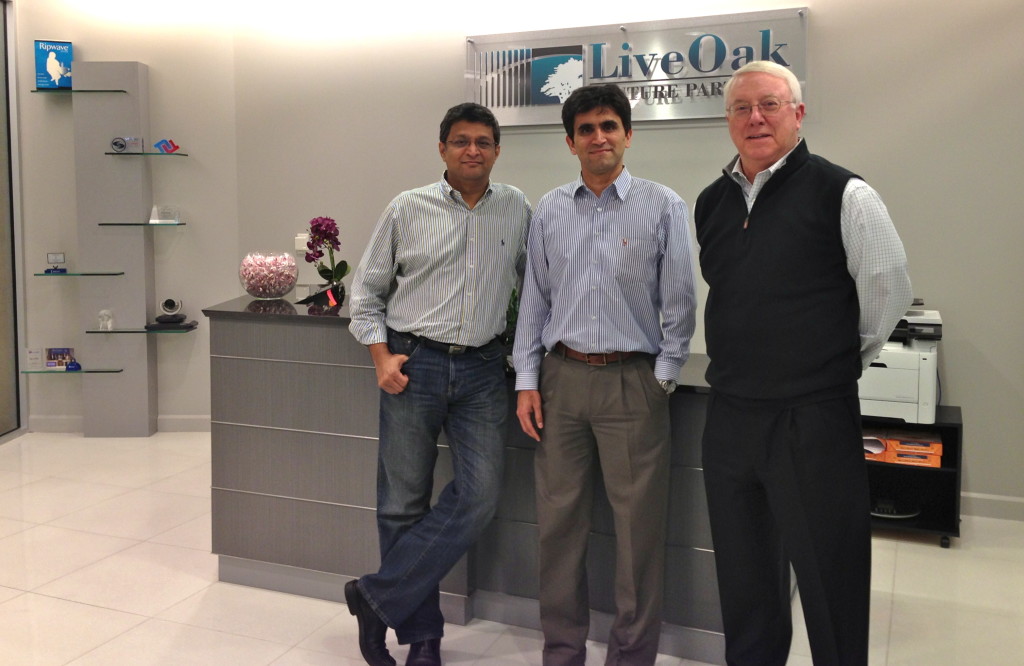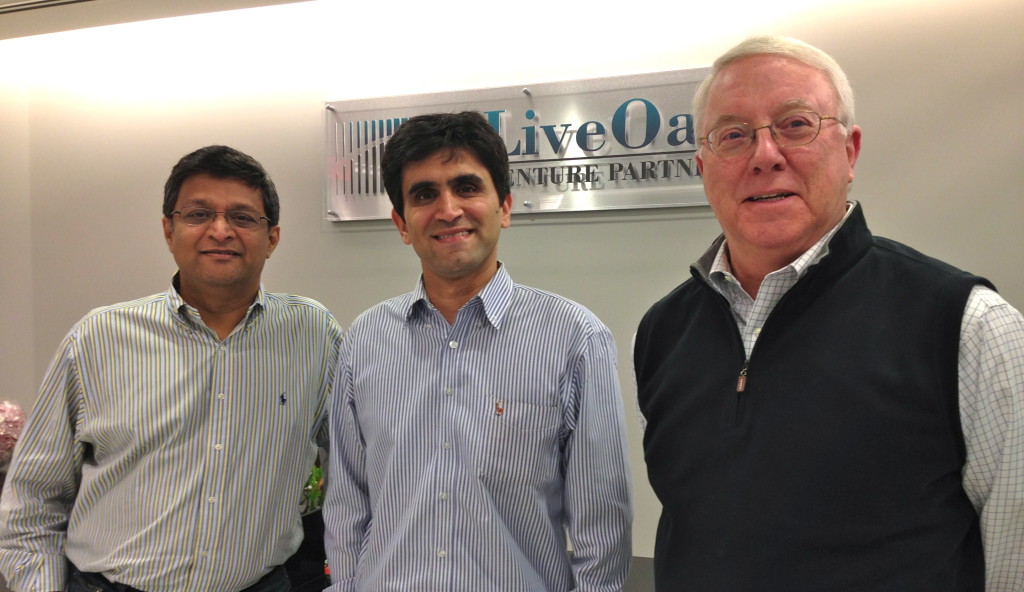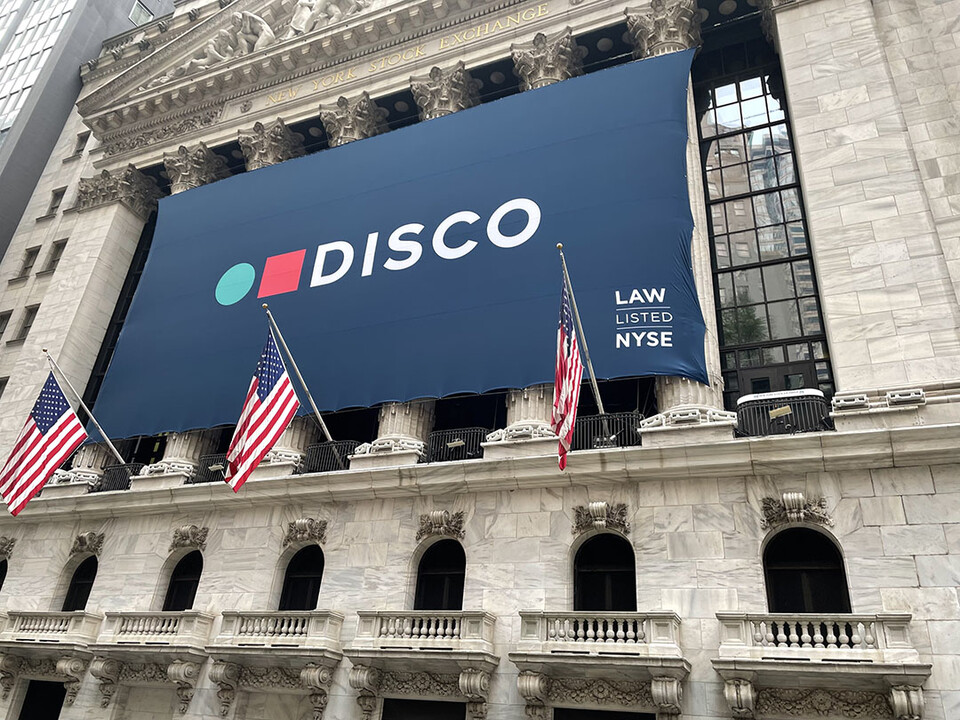By LAURA LOREK
Founder of Silicon Hills News
 Right now is the best time to be in the venture capital business in Austin.
Right now is the best time to be in the venture capital business in Austin.
In 2000, during the Dot Com boom, an enormous amount of money flowed into companies even though they did not have viable ideas and were also not disciplined with spending money, said Krishna Srinivasan, partner at LiveOak Venture Partners.
“Companies were burning money on products that costs tens of millions of dollars to build and to get any real traction,” he said during a recent interview at the firm’s headquarters in west Austin.
Austin Dot Com darlings included Living.com, a furniture store, Garden.com, garden supplies, and DrKoop.com, a website for medical advice. All of them went belly up.
Fast forward to today’s crop of startups in Austin. They include recently public companies like HomeAway.com, BazaarVoice and RetailMeNot. And dozens of promising startups in the software and technology industry as well as life sciences, energy, e-commerce and consumer goods.
“Maybe it’s the recent lack of capital that has forced entrepreneurs to be extra creative to make progress, or maybe it’s the natural maturation of the local ecosystem, this is clearly the highest quality of entrepreneurial activity we’ve seen in this market since 2000,” Srinivasan said. “We feel the momentum and see the quality. This place absolutely deserves a bunch of capital firms.”
And that’s why Srinivasan, who has worked at Motorola, Sematech and Austin Ventures, teamed up with two former Austin Ventures colleagues, Ben Scott and Venu Shamapant, to form a VC firm targeted at early stage investing into companies in Texas.
LiveOak Venture Partners Raises $100 million fund
LiveOak Venture Partners closed on a $100 million fund this year. However, it wasn’t easy to raise that much money. The partners spent two years on the fundraising trail. Like any other entrepreneur, they watched their expenses as they made progress on raising the fund. As a result, they have much greater empathy for entrepreneurs looking to raise money to fund their companies, Shamapant said.
The secret to their perseverance was having three members in the partnership, someone always had a more positive perspective which kept the others energized and moving forward, he said.
“We looked around at the Texas market and said how can you not have multiple funds to capitalize on this market,” Shamapant said. “That conviction really kept us going. We really believed that with our history of success combined with this market opportunity, we surely would emerge successful.”
“Capital Starved Startup Market”
Austin and Texas, in general, needed more venture capital funds to finance all of the activity going on here, Srinivasan said.
“The Texas market is the most opportunity rich capital starved startup market in the country,” he said.
While Austin Ventures does early stage investing and so do some other firms, a large untapped market opportunity still existed, Shamapant said.
“For example, if you looked at Silicon Valley, the market opportunity there allows several successful firms to exist,” he said. “Similarly, there are going to be multiple successful franchises here and we thought we could clearly build one of those ourselves.”
And the best time to enter a business is when an entrepreneur sees a compelling unmet opportunity, Scott said.
“If you are ever going to get great returns, it’s not when there’s an over-saturation of funds, it’s when there’s a shortage,” Scott said. “And so we felt like we were clearly in that situation. We felt like we were the team to take advantage of it. But we also surely picked one of the worst times in the last two decades to raise a fund.”
Ultimately with strong perseverance, a good story and a great track record, LiveOak Venture Partners did it, he said.
“And I think when you can raise money in tough times that’s an advantage,” he said.
Competition to Invest in Startups
Since LiveOak Venture Partners hung out its shingle last year, it has seen incredible deal flow, Scott said.
 Last year, they looked at a few hundred companies and invested in five deals including Veros Systems, Written.com, StepOne Inc., NSS Labs, all in Austin, and CS Disco in Houston. Over the course of this fund, they expect to invest in 15 to 17 companies in Austin, Texas and the greater Southwest.
Last year, they looked at a few hundred companies and invested in five deals including Veros Systems, Written.com, StepOne Inc., NSS Labs, all in Austin, and CS Disco in Houston. Over the course of this fund, they expect to invest in 15 to 17 companies in Austin, Texas and the greater Southwest.
But they also have strong competition for deals.
Last year, Silverton Partners, an early-stage venture capital firm focused on Austin-based companies, announced the formation of a $75 million early stage follow-on fund. Silverton also struck a partnership with Mike Maples Jr.’s Floodgate to finance startups at Capital Factory. Austin Ventures, the big daddy in VC money in Austin, also invests in early stage deals.
“We’re absolutely in competition for deals,” Shamapant said. “That’s good for the entrepreneur.”
But there are a lot of high quality companies in this market to keep multiple venture firms busy, he said.
The myth still prevails that most companies are built by 20-year-old kids who drop out of college to create the next Facebook. But in reality a large majority of the startups in the Austin and Texas market getting funded are founded by experienced executives and entrepreneurs who have worked in those industries before, Srinivasan said.
But don’t discount the energy and creativity that young entrepreneurs bring to the market, Scott said. They have a “lack of baggage” and can view problems in a new light, he said.
“At the end of the day, what is crucial for success is to satisfy your customers and also figure out a scalable go to market strategy for it,” he said.
And that’s where a firm like LiveOak Venture Partners sees its sweet spot in helping entrepreneurs.
“We are very active with respect to collaborating with our entrepreneurs to help make their companies successful,” Scott said.
LiveOak Partners provides a lot of support in building a startups’ teams, he said. They also help them with strategic decisions, introduce them to key customers, partnerships and other potential investors and in the end help them with exit strategies, he said.
“Our access to talent, our access to strong executives with experience and our own long experience in investing are big assets to companies,” he said.
LiveOak understands the plight of the entrepreneur, said Kiwi Camara, CEO of CS Disco, which closed on $2 million in Series A funds from the firm in January.
The Houston-based startup makes software for lawyers to use to research cases.
“They’ve been great to work with,” Camara said.
Josh Kerr, co-founder of Austin-based Written.com, met Srinivasan at a 3-Day Startup event and then eventually met with the other partners. He and his cofounders were close to doing a deal with another firm, but decided to go with LiveOak Partners instead.
“They went from being a firm we weren’t considering to our top choice,” he said. “They seemed to really have done their homework on us.”
Last November, Written.com received $1 million in seed stage funding from LiveOak, Floodgate in California and several angel investors. The startup connects bloggers with brands interested in licensing their content.
Kerr had never created a company with VC money and he and his partners wanted to develop a good relationship with a VC firm that would also work with them and help them grow from a startup to a big company, he said.
“They’ve been great to work with,” Kerr said. “They are bringing us a ton of value.”
LiveOak finds startups through introductions and online.
“We are eager to meet entrepreneurs,” Shamapant said. “We’re as eager as the entrepreneurs are to meet us.”
It looks to invest in entrepreneurs who have a real problem that they’ve actually experienced themselves and they are trying to solve.
“A lot of people think they’ve got to have a whole business plan. It’s really not that. The first meeting all we’re trying to understand is do you have a problem to solve? Do you have a unique way to solve it that allows you to build a business on it.”
LiveOak Venture Partners investments are not limited to Texas, but that is its focus, Srinivasan said. Last year, LiveOak wrote checks ranging from $250,000 to $4 million, he said.
“We are not likely to put $100,000 into 10 companies and just sit back and see what bubbles to the top,” he said. “If we invest in a company we will spend meaningful time with the team to help them rapidly converge on their next milestones and financing.”



